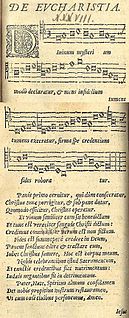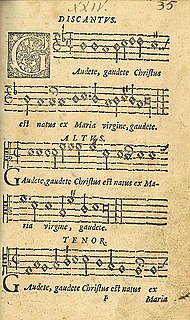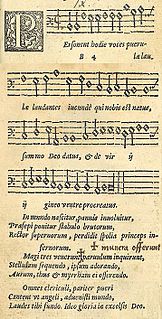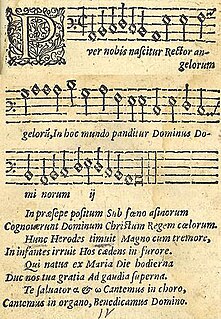 W
WPiae Cantiones ecclesiasticae et scholasticae veterum episcoporum is a collection of late medieval Latin songs first published in 1582. It was compiled by Jacobus Finno, a clergyman who was headmaster of the cathedral school at Turku. Publication was undertaken by Theodoricus Petri Rutha of Nyland, who lived from about 1560 to about 1630. He came from an aristocratic family in Finland, and was educated at Rostock.
 W
W"Ave maris stella" is a medieval Marian hymn, usually sung at Vespers. It was especially popular in the Middle Ages and has been used by many composers as the basis of other compositions.
 W
W"Of the Father's heart begotten" alternatively known as "Of the Father's love begotten" is a doctrinal hymn based on the Latin poem "Corde natus" by the Roman poet Aurelius Prudentius, from his Liber Cathemerinon beginning "Da puer plectrum" which includes the Latin stanzas listed below.
 W
WGaudete is a sacred Christmas carol, thought to have been composed in the 16th century. It was published in Piae Cantiones, a collection of Finnish/Swedish sacred songs published in 1581. No music is given for the verses, but the standard tune comes from older liturgical books.
 W
W"Good King Wenceslas" is a Christmas carol that tells a story of a Bohemian king going on a journey and braving harsh winter weather to give alms to a poor peasant on the Feast of Stephen. During the journey, his page is about to give up the struggle against the cold weather, but is enabled to continue by following the king's footprints, step for step, through the deep snow. The legend is based on the life of the historical Saint Wenceslaus I, Duke of Bohemia or Svatý Václav in Czech (907–935). The name Wenceslas is a Latinised version of Old Czech "Venceslav".
 W
W"In dulci jubilo" is a traditional Christmas carol. In its original setting, the carol is a macaronic text of German and Latin dating from the Middle Ages. Subsequent translations into English, such as J. M. Neale's arrangement "Good Christian Men, Rejoice" have increased its popularity, and Robert Pearsall's 1837 macaronic translation is a mainstay of the Christmas Nine Lessons and Carols repertoire. J. S. Bach's chorale prelude based on the tune is also a traditional postlude for Christmas services.
 W
W"Jesus Christus nostra salus" is a hymn in Ecclesiastical Latin celebrating the Eucharist. It first is confirmed to have appeared in a manuscript in 1410. For a long time it was attributed to Johannes Hus, but was more likely written by the Archbishop of Prague, Jan of Jenštejn. Several hymns in different languages were derived from it, among others Martin Luther's "Jesus Christus, unser Heiland, der von uns den Gotteszorn wandt".
 W
W"Of the Father's heart begotten" alternatively known as "Of the Father's love begotten" is a doctrinal hymn based on the Latin poem "Corde natus" by the Roman poet Aurelius Prudentius, from his Liber Cathemerinon beginning "Da puer plectrum" which includes the Latin stanzas listed below.
 W
W"Personent hodie" is a Christmas carol originally published in the 1582 Finnish song book Piae Cantiones, a volume of 74 Medieval songs with Latin texts collected by Jacobus Finno, a Swedish Lutheran cleric, and published by T.P. Rutha. The song book had its origins in the libraries of cathedral song schools, whose repertory had strong links with medieval Prague, where clerical students from Finland and Sweden had studied for generations. A melody found in a 1360 manuscript from the nearby Bavarian city of Moosburg in Germany is highly similar, and it is from this manuscript that the song is usually dated.
 W
W"Puer nobis nascitur", usually translated as "Unto Us Is Born a Son", is a medieval Christmas carol found in a number of manuscript sources—the 14th-century German Moosburg Gradual and a 15th-century Trier manuscript. The Moosburg Gradual itself contained a number of melodies derived from the 12th- and 13th-century organum repertories of Notre Dame de Paris and the Abbey of Saint Martial, Limoges, suggesting that its antiquity may be much greater.
 W
WResonet in laudibus, translated into English as "Let the voice of praise resound", is a 14th-century carol which was widely known in medieval Europe, and is still performed today. Although probably earlier, in manuscript form it first appears in the Moosburg Gradual of 1360 and occurs in several 15th, 16th and 17th century printed collections from both Catholic and Lutheran traditions.
 W
W"Good King Wenceslas" is a Christmas carol that tells a story of a Bohemian king going on a journey and braving harsh winter weather to give alms to a poor peasant on the Feast of Stephen. During the journey, his page is about to give up the struggle against the cold weather, but is enabled to continue by following the king's footprints, step for step, through the deep snow. The legend is based on the life of the historical Saint Wenceslaus I, Duke of Bohemia or Svatý Václav in Czech (907–935). The name Wenceslas is a Latinised version of Old Czech "Venceslav".
 W
W"Puer nobis nascitur", usually translated as "Unto Us Is Born a Son", is a medieval Christmas carol found in a number of manuscript sources—the 14th-century German Moosburg Gradual and a 15th-century Trier manuscript. The Moosburg Gradual itself contained a number of melodies derived from the 12th- and 13th-century organum repertories of Notre Dame de Paris and the Abbey of Saint Martial, Limoges, suggesting that its antiquity may be much greater.